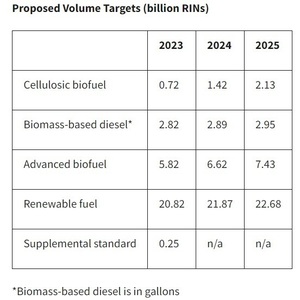EPA opens registration for Jan. 10 hearing on RFS “set” rule

December 14, 2022
BY Erin Krueger
The U.S. EPA is now accepting registrations for a virtual public hearing to be held Jan. 10 on its proposed Renewable Fuel Standard “set” rule, which includes renewable volume obligations for 2023, 2024 and 2025 and outlines the agency’s plans for the generation of e-RINs from eligible sources of renewable electricity. The hearing may be extended through Jan. 11, if necessary, to accommodate the number of people who sign up to testify.
The EPA released its proposed “set” rule on Dec. 1. The proposed rule sets the 2023, 2024 and 2025 RVOs at 20.82 billion gallons, 21.87 billion gallons, and 22.68 billion gallons, respectively. A 250-million-gallon supplemental obligation would also be imposed for 2023. That supplemental obligation aims to address remand of the 2014-2016 annal rule by the D.C. Circuit Court of Appeals in Americans for Clean Energy v. EPA. A similar 250-million-gallon supplemental obligation was implemented for compliance year 2022.
Advertisement
The proposed “set” rule also includes long-awaited regulatory provisions to allow renewable identification number (RINs) to be generated for renewable electricity used to fuel vehicles (eRINs). The EPA’s proposed approach for eRINs would allow vehicle original equipment manufacturers (OEMs) to generate eRINs based on the light-duty electric vehicles they sell by establishing contracts with parties that produce electricity from qualifying biogas. Under the proposal, eRINs would represent the quantity of renewable electricity determined to be used by both new and previously sold (legacy) light-duty vehicles for transportation, provided that sufficient renewable electricity has been produced and contracted by the OEM.
During the virtual public hearing, each commenter will have 3 minutes to provide oral testimony. The EPA may ask clarifying questions during the oral presentations, but will not respond to the presentations at that time.
Advertisement
Written statements and supporting information submitted during the comment period will be considered with the same weight as oral comments and supporting information presented at the public hearing.
All hearing attendees, including those who do not intend to provide testimony, are directed to register for the event by Jan. 3. Additional information is available on the Federal Register website.
Related Stories
CountryMark on July 22 celebrated the completion of more than $100 million in upgrades at its refinery in Indiana, including those related to soybean oil storage. The facility produces renewable diesel via coprocessing technology.
ATOBA Energy and Air Moana are partnering to implement scalable solutions for the supply of SAF. The collaboration aims to ensure long-term SAF availability while supporting local initiatives to develop sustainable fuel production in Tahiti.
While final IRS guidance is still pending, the foundation of the 45Z program is well defined. Clean fuel producers should no longer be waiting; they can now move forward with critical planning and preparation, according to EcoEngineers.
Neste Corp. on July 24 released second quarter results, reporting record quarterly renewable product sales volumes despite weaker margins. SAF sales were up nearly 80% when compared to the first quarter of 2025.
Valero Energy Corp. on July 24 released second quarter results, reporting a profitable three-month period for its ethanol segment. The renewable diesel segment posted a loss, but the company’s new sustainable aviation fuel (SAF) unit operated well.
Upcoming Events










